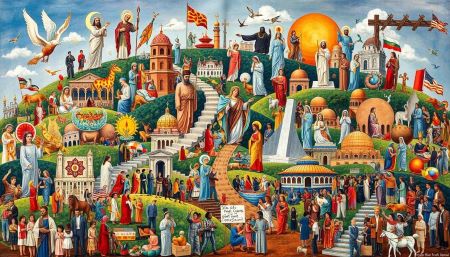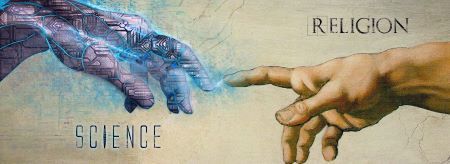Religion has profoundly influenced human society, providing both solace and controversy
Bill Tammeus (wtammeus@gmail.com), an American friend of mine, lives in Kansas City, Missouri. He visited India with his father, an agricultural expert, around 1957 and was my classmate at Boys High School, Allahabad. After returning to the U.S., Bill became a journalist.
Now retired, he engages in social work and serves as a preacher in his Presbyterian Church.
Bill also writes a blog called Bill’s Faith Matters Blog, where he regularly shares his thoughts. His latest post, titled “A Foundational Question: What the Heck Is the Purpose of Religion?”, explores his understanding of religion’s role.
As a believer in God, Bill has a perspective on religion that differs from mine. I am an atheist and regard all religions as superstitions, holding that truth lies in science—an ever-evolving discipline. While we differ in our beliefs, we both seek to understand the purpose of religion in human life.
Why Do People Believe in Religion?

Despite being unscientific, religion remains integral to the lives of the vast majority of people worldwide. Why is this so?
The majority of the world’s population lives in poverty. Their lives are so harsh and uncertain that they turn to religion for psychological support. Without this emotional crutch, many might fall into despair, even to the point of madness or suicide. For the poor, religion serves as a mechanism to endure suffering and find meaning amidst chaos.
But why do relatively well-off individuals also cling to religion?
That is because we are still at a low level of development of science (compared to what it will be, say, after 100 years hence ). In other words, the chance factor is still very powerful in our lives.
We plan something, but something else happens. In other words, we cannot control our lives. So we believe there are some supernatural powers like God which control our lives, and which must be propitiated to keep them benevolent and not turn malevolent.
 For instance, a businessman launching a new venture cannot be entirely confident of its success. Economic downturns or unforeseen events may cause losses, despite meticulous planning. Faced with such uncertainties, even the affluent may turn to religion, hoping for divine intervention.
For instance, a businessman launching a new venture cannot be entirely confident of its success. Economic downturns or unforeseen events may cause losses, despite meticulous planning. Faced with such uncertainties, even the affluent may turn to religion, hoping for divine intervention.
As Shakespeare observed in King Lear:
“As flies to wanton boys are we to the gods; they kill us for their sport.”
However, I believe that as science advances, humanity will increasingly gain control over its destiny. Also, exploitation of man by man will by then end. A century from now, science may evolve to such an extent that religion will become obsolete, fading into irrelevance.
Religion and Science
 Religion and science are fundamentally opposed. They are polar opposites, and the claim that they complement each other is baseless.
Religion and science are fundamentally opposed. They are polar opposites, and the claim that they complement each other is baseless.
• God vs. Science
Religion posits the existence of a supernatural entity called God—immortal, omnipotent, merciful, and good. Science, however, rejects the concept of supernatural entities. It holds that nothing in the universe is permanent; everything is in flux, governed by discoverable natural laws.
Science acknowledges no entities like God, angels, demons, or souls. Consequently, it dismisses beliefs in transmigration, resurrection, or divine judgment. The only reality, according to science, is matter in motion, governed by laws that can be understood through research.
When asked, “Who created matter?” science answers: matter comes from matter. It was not created by a divine entity; its form may change, but its essence remains.
• Explanations of Phenomena
Religion attributes natural phenomena to divine forces. For instance, it was once believed that smallpox was the wrath of a goddess or that rain depended on the favour of the god Indra.
Science, on the other hand, provides evidence-based explanations. Smallpox, for example, is caused by a virus and can be prevented through vaccination. Similarly, rain results from low-pressure systems forming over heated land—not divine intervention.
• Faith vs. Evidence
Religion relies on faith and divine revelation. Science, by contrast, is grounded in observation, experimentation, and reason.
• Finality vs. Progress
Religious doctrines—such as the Vedas, Quran, or Bible—are considered immutable. Science, however, is ever-changing, constantly tested, and refined.
For example, theories of light have evolved over centuries. Newton proposed the particle theory in 1666, Huygens introduced the wave theory in 1678, and later, Max Planck developed quantum theory. These ideas were further refined by quantum mechanics, as propounded by Heisenberg, Schrödinger, and others.
• Creation vs. Evolution

Religion claims that the universe and all living beings were created at a specific time by God.
Science, through Darwin’s theory of evolution, demonstrates that life forms evolved over time.
• The Creator Fallacy
Religion insists that the universe must have a creator—God. But if everything requires a creator, then who created God? This leads to the fallacy of infinite regress, where each creator must have a creator, ad infinitum.
• The Problem of Suffering
Religion claims that God is omnipotent, merciful, and benevolent. Yet, millions of children suffer from hunger, cold, and deprivation.
Why does this merciful God not alleviate their suffering?

Why is there so much poverty, unemployment, malnourishment, and sickness in the world? If God is omnipotent and merciful, why does He not abolish these hardships and ensure a decent life for all?
While some scientists have believed in God, this merely illustrates the coexistence of scientific and unscientific ideas in the same mind. It may take generations before humanity completely discards unscientific beliefs.
Apart from the above, the purpose of religion is also to serve as an opium of the people, and as a means to exploit the people by the rulers who often use religion to divide people on religious lines as part of their divide and rule policy.
All religions are superstitions and false. The truth lies in science, which continues to evolve and refine our understanding of the universe. For India to progress, we must transition from a reliance on religion to an embrace of science. ![]()
________
Also Read:
Kumbh Mela in Prayag
Disclaimer : PunjabTodayNews.com and other platforms of the Punjab Today group strive to include views and opinions from across the entire spectrum, but by no means do we agree with everything we publish. Our efforts and editorial choices consistently underscore our authors’ right to the freedom of speech. However, it should be clear to all readers that individual authors are responsible for the information, ideas or opinions in their articles, and very often, these do not reflect the views of PunjabTodayNews.com or other platforms of the group. Punjab Today does not assume any responsibility or liability for the views of authors whose work appears here.
Punjab Today believes in serious, engaging, narrative journalism at a time when mainstream media houses seem to have given up on long-form writing and news television has blurred or altogether erased the lines between news and slapstick entertainment. We at Punjab Today believe that readers such as yourself appreciate cerebral journalism, and would like you to hold us against the best international industry standards. Brickbats are welcome even more than bouquets, though an occasional pat on the back is always encouraging. Good journalism can be a lifeline in these uncertain times worldwide. You can support us in myriad ways. To begin with, by spreading word about us and forwarding this reportage. Stay engaged.
— Team PT


